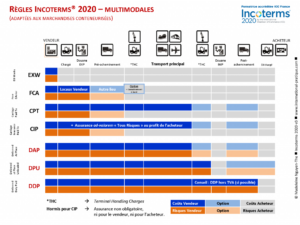Incoterms (International Commercial Terms) are standardized international trade terms published by the International Chamber of Commerce (ICC). They are essential for international trade as they define the responsibilities of buyers and sellers regarding the delivery of goods. Incoterms specify who is responsible for transport costs, insurance, customs formalities, and the risk of loss or damage to the goods during transit.
There are eleven Incoterms in effect since the latest 2020 revision, each with specific implications. For example, EXW (Ex Works) places maximum responsibility on the buyer, who must cover all costs and risks once the goods are ready to be picked up at the seller’s premises. Conversely, DDP (Delivered Duty Paid) requires the seller to cover all costs, including customs duties, until the goods are delivered to the final destination.

Understanding and choosing the right Incoterm is crucial to avoid disputes and ensure a clear allocation of responsibilities. For example, the choice between FOB (Free On Board) and CIF (Cost, Insurance, and Freight) can significantly influence total costs and risks for the parties involved.
Incoterms are therefore an indispensable tool for companies operating internationally, as they facilitate clarity and predictability in commercial transactions. Misuse or misunderstanding of these terms can lead to unforeseen costs and legal disputes. For this reason, it is often advisable to consult logistics or commercial law experts to ensure that Incoterms are correctly applied in international contracts.